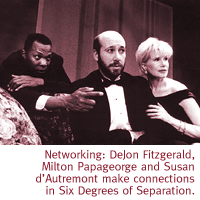

|

The UA's Arizona Repertory Theatre stages 'Six Degrees of Separation.'
By Dave Irwin
SIX DEGREES OF Separation, the highly literate post-modernist
play by John Guare, asks what happens when reality turns out to
be fraudulent, but more interesting than truth. Six Degrees
effectively questions the human condition at both superficial
and deeper levels. The UA's Arizona Repertory Theatre's straightforward
presentation of this witty and thoughtful work, directed by Neil
Vanderpool, effectively balances entertainment and message.
 The plot involves a likable chameleon character of convincing
but ultimately dubious claims who ingratiates himself into peoples'
lives. Along the way, the play manages to question our notions
on a variety of themes without ever hammering, including racism,
art, reality, love, celebrity, money, homosexuality, family, theater
and the judicial system. Guare's script doesn't posit answers;
it merely seeks resonance from the audience through its characters
and circumstances. It's a busy but never cluttered 100 minutes.
The plot involves a likable chameleon character of convincing
but ultimately dubious claims who ingratiates himself into peoples'
lives. Along the way, the play manages to question our notions
on a variety of themes without ever hammering, including racism,
art, reality, love, celebrity, money, homosexuality, family, theater
and the judicial system. Guare's script doesn't posit answers;
it merely seeks resonance from the audience through its characters
and circumstances. It's a busy but never cluttered 100 minutes.
 Vanderpool, an adjunct instructor in the Theatre Arts Department,
has done an excellent job with his charges, who range from MFA
candidates to undergraduate tyros. On opening night, their biggest
challenge was adjusting subtle timing changes in their deliveries
in the face of the unpredictability of a live audience's laughter.
Susan d'Autremont and Milton Papageorge handled their roles well
as the snobbish upwardly mobile couple, Ouisa and Flan Kittredge.
Their portrayal managed to be both comic and pathetic when, for
example, they are trying to weasel a $2 million loan, making chit-chat
about driving through the poorest parts of Soweto, South Africa,
to see what misery looks like.
Vanderpool, an adjunct instructor in the Theatre Arts Department,
has done an excellent job with his charges, who range from MFA
candidates to undergraduate tyros. On opening night, their biggest
challenge was adjusting subtle timing changes in their deliveries
in the face of the unpredictability of a live audience's laughter.
Susan d'Autremont and Milton Papageorge handled their roles well
as the snobbish upwardly mobile couple, Ouisa and Flan Kittredge.
Their portrayal managed to be both comic and pathetic when, for
example, they are trying to weasel a $2 million loan, making chit-chat
about driving through the poorest parts of Soweto, South Africa,
to see what misery looks like.
DeJon Fitzgerald as Paul, the black man who enters their lives
claiming to know their children at Harvard and also to be Sidney
Poitier's son, is more earnest than sophisticated in his presentation.
While his early characterization was somewhat stilted, he came
alive in his later scenes. He was powerfully convincing as he
shamelessly shifted his story to being the illegitimate son of
Flan Kittridge, and persuasively sincere in the end as he pleaded
for atonement, a sincerity undermined by his preceding deceptions.
That the audience leaves entertained, yet disturbed and confused
by Paul's identity and fate, forgetting that he is a character,
is the triumph of Six Degrees of Separation.

|
 |





